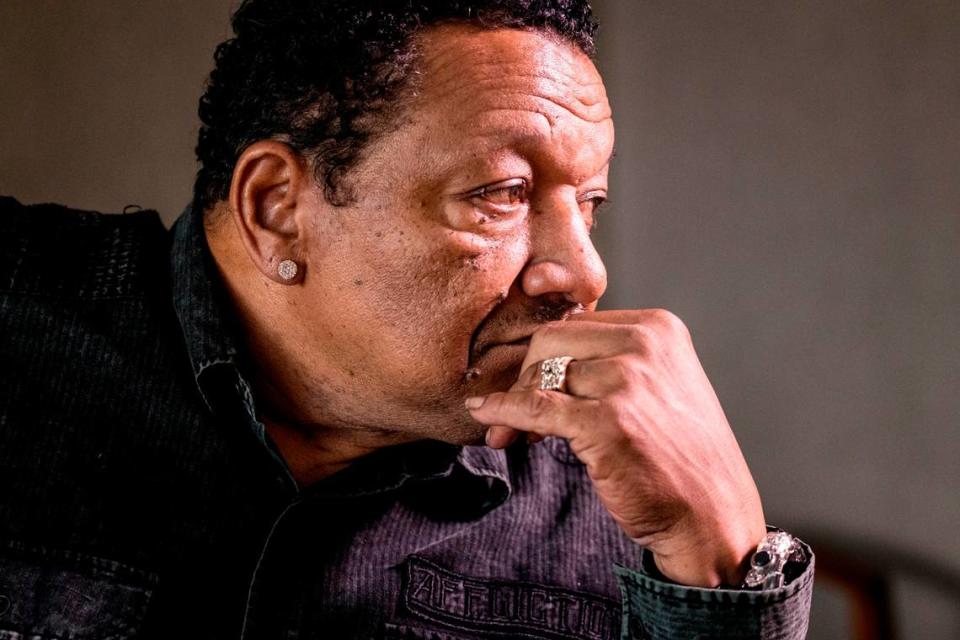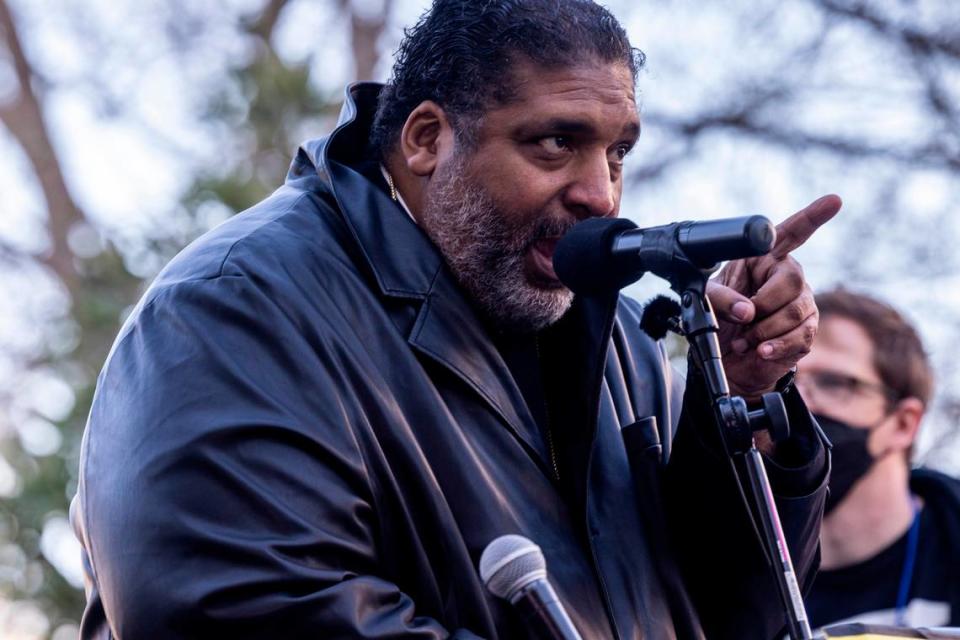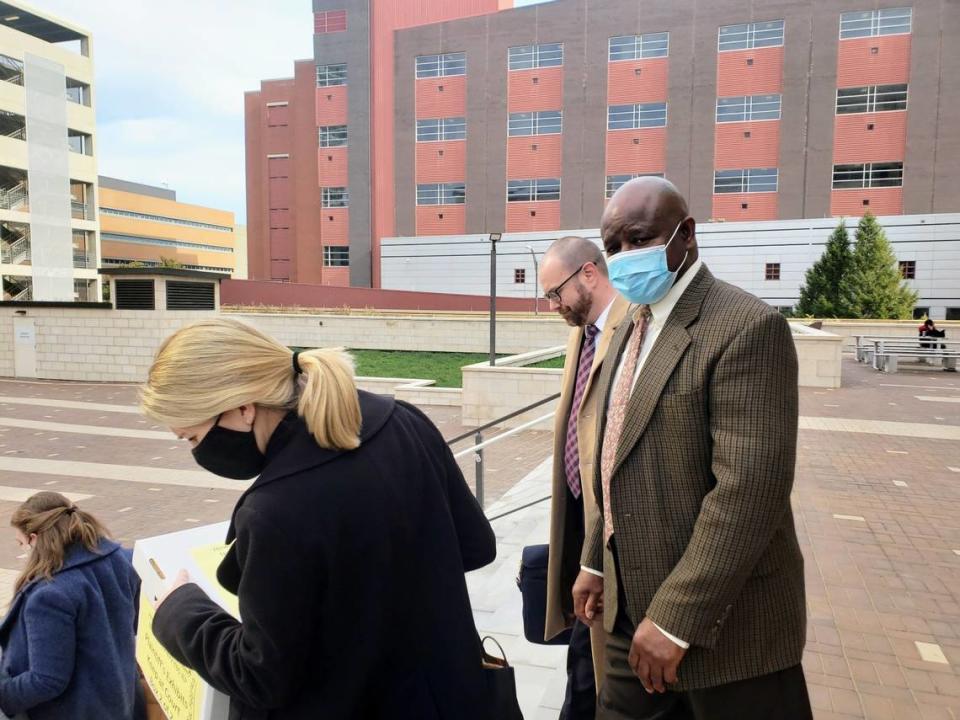A federal jury awarded Darryl Howard $6 million. The city of Durham will not pay him.
A man who successfully fought to have two murder convictions overturned, was pardoned by the governor and won a $6 million judgment for civil rights violations by a Durham police detective will likely never see most of the money after the Durham City Council decided it won’t pay.
Darryl Howard couldn’t believe it when told the city wouldn’t indemnify retired detective Darrell Dowdy, meaning it wouldn’t pay the jury’s judgment. The determination is particularly concerning and confusing since the city paid millions of dollars for attorneys who attacked Howard’s character during the trial, Howard and his attorney said.
Durham officials have fought him every step of the way, Howard said.
“I proved my innocence. I went through every court,” he said. “Every judge says what this was, even the governor.”
“I don’t understand that,” he said. “Now I have to fight again.”
On Dec. 1 a federal jury awarded Howard $6 million after finding Dowdy fabricated evidence and performed an inadequate investigation that led to Howard being wrongly convicted of two counts of second-degree murder and one count of arson.
After a nearly month-long trial, it took the jury about an hour to reach a decision.
The city has spent more than $4 million on litigation against Howard. Legal expenses have been paid out of a fund for uninsured legal liabilities.
Howard and his attorney said the city, which employed Dowdy for 36 years, gave the detective the power that led to Howard spending over two decades incarcerated after a Durham County jury found him guilty of killing Doris Washington, 29, and her 13-year-old daughter, Nishonda, in 1991.
In a move that Howard’s and Dowdy’s attorneys described as unprecedented, the Durham City Council decided in a series of closed session meetings not to pay the judgment on Dowdy’s behalf.
In legal filings, the city has also indicated it will ask Howard to pay the legal fees of two city employees who were dismissed from the lawsuit.
The judgment marks the first time a jury has found “a bad faith finding,” against a Durham employee, City Attorney Kimberly Rehberg said. Rehberg initially spoke to a reporter last month and responded to follow-up questions in emails.
A city resolution establishes a uniform standard in addressing claims against the city and outlines a policy to defend officers and employees against civil claims and judgments, city attorneys have said.
Unless the city has evidence or information to indicate otherwise, “the city generally proceeds under the presumption that, however conduct may have been portrayed in a complaint, the employee was engaged in the good faith execution of their duties on behalf of the city and was, thus, entitled to a defense,” Rehberg wrote.
The City Council decided not to pay the judgment during closed session meetings between December and February, Rehberg wrote. The meetings were closed for attorney-client consultation to respond to demands made by Howard’s and Dowdy’s attorneys.
The city’s resolution states that it’s in the public interest to settle judgments against the city “if the facts and circumstances of the claim or the suit in which the judgment is entered show that the officer or employee was engaged in the good faith performance of his duties on behalf of the City when the act or omission giving rise to the claim or suit occurred,” wrote Rehberg in an email, in which she added an emphasis on good faith.
“A jury of Mr. Dowdy’s peers determined that Mr. Dowdy engaged in fabrication of evidence and a bad faith failure to investigate,” she wrote.
Mayor Pro Tempore Mark-Anthony Middleton declined to comment on the ongoing legal issue.
When asked why the city would pay for Dowdy’s attorneys but not the judgment against him, Rehberg said initially the city and other employees were named in the lawsuit, but those claims were dismissed or dropped by the time the case made it to trial.
Rehberg also said some of the concerns raised during the trial weren’t outlined from the beginning.

‘It is offensive’
One of Howard’s attorneys, Brad Bannon, contends the facts of the case were available to the city from the beginning.
When the city decided to represent Dowdy, Bannon said, it agreed to defend his conduct.
“They go through that whole process. They pay all of that money. They enrich a bunch of lawyers, and then the moment they have to pay the actual victim of the city’s conduct here, they say we’re not going to back this,” Bannon said.
Bannon said Durham’s stance is indefensible, morally wrong and inconsistent with the progressive values city leaders portray.
“Do you know how hard that is in a system that gives police officers almost absolute immunity, that gives prosecutions complete immunity,” and win, Bannon asked.
“It is not easy, I can tell you that,” he continued. “And he [Howard] did. And it is offensive that it is not being honored.”
Barber calls for Durham to reverse decision
The Rev. William J. Barber, the leader of the Moral Monday protests in North Carolina and co-founder of the national Poor People’s Campaign, called city officials’ decision an injustice.
If officials knew they weren’t going to pay the judgment, they shouldn’t have spent taxpayer money defending the detective from the outset.
If change is going to come in the systems that employ police officers, he said, cities need to be held accountable.
“While Mr Howard didn’t die, his life died. His years died. His opportunity died. His time died,” Barber said. “You took 20 years.”
Barber called on the City Council to reverse its decision.
“It needs to happen and happen soon,” he said. “At the end of the day, enough has been taken from this man. Enough has been hurt in this man. If anything, the council ought to be running to do the right thing rather than putting this man through more trauma and more abuse than he has already experienced.”

Darrel Dowdy
Patricia Shields got involved in the case in August after the city indicated it might not settle or pay a jury’s judgment against Dowdy, she said. She had represented officers in the past, and Dowdy’s other attorneys asked her to work with the city on that issue.
Shields said she was told a decision hadn’t been made but that the city’s lawyers didn’t believe the city was required to pay a judgment if Dowdy lost. Shields disagrees.
It is inconsistent to pay millions of dollars to defend Dowdy but then refuse to pay the judgment, she said.
“The city has known all along what Captain Dowdy did and decided to defend him on that basis,” she said.
Shields said she is disappointed.
“I am upset on behalf of my client, Capt. Dowdy, who spent 30 years of his life protecting the citizens of Durham,” she said. “I am upset on behalf of the other officers in the city of Durham,” as the decision raises questions about whether they can count on the city to stand behind behind them if they get sued.
For Dowdy, the decision is devastating, she said. Dowdy made nearly $76,000 annually when he retired in 2007, according to city records.
“This is something that will financially ruin him,” she said.
The News & Observer left messages with two other of Dowdy’s attorneys, including one who represented him during the trial and the attorney who Shields said will be moving forward with the case. Neither returned messages. A representative of the Durham Fraternal Order of Police Lodge 2, an officers’ advocacy organization, declined to comment.

Three decades of fighting
For nearly three decades, Darryl Howard has been fighting the system on various levels.
Sentenced to 80 years in prison in 1995, Howard finally convinced Durham Senior Resident Judge Orlando Hudson to vacate his convictions in 2014, but prosecutors appealed. Howard, who is now nearly 60, was represented by attorneys from the Innocence Project, which seek exoneration for people who have been wrongly convicted.
Howard’s hearings outlined new DNA evidence made available after the court approved in 2010 new tests on the sexual assault evidence. They found semen in the mother was from a man affiliated with a gang that Howard says is actually responsible for the killings.
Hudson found that former District Attorney Mike Nifong and Durham police withheld crucial evidence from Howard during his trial.
After another hearing, Howard won his freedom after Hudson again vacated Howard’s convictions in 2016. Prosecutors didn’t pursue new charges.
Nifong, then an assistant district attorney, was later disbarred for prosecutorial misconduct in the Duke University lacrosse case for ethics violations. Tracey Cline, another Durham district attorney who was disbarred, also made a key directive in the case, telling police to not investigate the new DNA, The News & Observer reported.
North Carolina Gov. Roy Cooper pardoned Howard in 2021.
‘Talk about me like a dog’
Howard’s federal lawsuit, filed in 2017, initially sought damages against the city of Durham, former and current officers, and a fire department employee involved in the investigation.
Over the course of pretrial actions, the defendants were narrowed to Dowdy.
Howard’s attorneys had sought $48 million in damages. That equals $2 million for each year of the 21 1/2 years he spent in prison and $5 million for the impact on his life after he was released.
Dowdy’s attorney told the jury it should award no more than $500,000, considering his drug addiction, drug dealing and history of being shot about 10 times in five incidents.
Howard, who now works as a cook at a local hotel, described Dowdy’s defense strategy as frustrating.
He had a past, he said, but he didn’t kill anyone.
“The lawyers have been talk[ing] about me like a dog,” Howard said, “and they got paid.”
The $6 million judgment, much lower than other recent wrongful-conviction federal judgments, won’t make up for three decades of trauma and turmoil, he said. Still, it would help him survive, help his family, and possibly help him move away from Durham.
“Who wants to trade 25 years for $6 million?” Howard said. “Nobody.”
The Durham Report
Calling Bull City readers! We've launched The Durham Report, a free weekly digest of some of the top stories for and about Durham published in The News & Observer and The Herald-Sun. Get your newsletter delivered straight to your inbox every Thursday at 11 a.m. featuring links to stories by our local journalists. Sign up for our newsletter here. For even more Durham-focused news and conversation, join our Facebook group "The Story of my Street."

